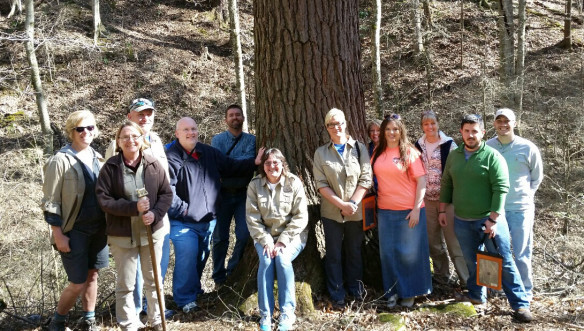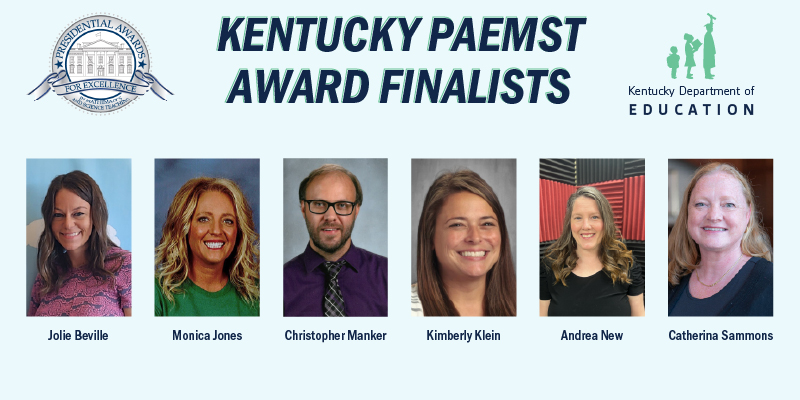
Melinda Curless, from left, Melinda Wilder, Chris Bentley, Greg Prater, Zach Collier Katrina Slone, Anji Davidson, Jan Caudill, Karen Miles, Regina Donour, James Hall and Tyler Watts were the first group of teachers to go through Expeditionary Learning Fellows Initiative.
Photo by Robert Watts, March 17, 2016
By Chris Bentley
chris.bentley@education.ky.gov
The Kentucky Valley Educational Cooperative (KVEC) is pioneering an exciting initiative that will increase place-based inquiry learning in classrooms across the region.
The Expeditionary Learning Fellows (ELF) Initiative is one of the latest components of the Appalachian Renaissance Initiative, which launched when KVEC and 17 member school districts in eastern Kentucky were awarded a Race-to-the-Top District grant by the U.S. Department of Education in 2014. The grant supports bold and locally directed improvements in leadership, learning and teaching that directly improve student achievement. The KVEC consortium’s Appalachian Renaissance Initiative (ARI) serves as an innovation laboratory for public education with an emphasis on rural communities.
The creation of the Expeditionary Learning Fellows Initiative stemmed from the ARI theory of action that is driven by an inquiry approach to personalized student learning, personalized professional learning, problem-solving and solution-oriented design that is unique to the needs of each individual and each system. The ELF Initiative is built on long-standing collaborations with K-12 and higher education, community organizations and other partners from across the state and the country.
One of those partners – Director Melinda Wilder of Eastern Kentucky University’s Division of Natural Areas – has an ongoing professional relationship with educators and students across the region. Wilder and her staff, in partnership with educators at Letcher County Central High School, would conduct two-day learning experiences for local students each year. These experiences were staged at Lilley Cornett Woods, an old-growth forest located in Letcher County and maintained by EKU. Students would investigate phenomena such as stream chemistry, explore relationships between macroinvertebrates and stream quality, use field guides for tree identification, discern different mammals by footprints and skull structure, and learn the history, value and beauty of this perfectly maintained and unspoiled environment.
As rich as the learning experiences were for students, there was room for improvement. Regional educators began exploring how the implementation of the Kentucky Academic Standards for Science could positively affect students’ abilities to reason and employ the practices of scientists. It became clearer that we needed to transform these experiences from pre-developed, teacher-driven lessons to student-centered inquiries and investigations. Rather than thinking about this transition as an obstacle, we viewed it as an opportunity to increase educator capacity by building a vision of inquiry and an understanding of how students can be better served by driving the investigations themselves.
A team of highly experienced educators is leading this effort – Wilder; Katrina Slone, KVEC STEM lead; Melinda Curless, STEM initiatives consultant at the Kentucky Department of Education (KDE); and Chris Bentley, KDE regional network science consultant. The team began planning and recruiting teachers for this project in late fall 2015 and have worked to identify and implement the educator professional learning that will be necessary to underpin this work.
The Expeditionary Learning Fellows (ELFs) initiating this endeavor are made up of K-12 teachers from all across the KVEC region. All of them are highly skilled educators and leaders within their respective districts.
The goals of the Expeditionary Learning Fellows Initiative are to:
- Construct a vision and deep understanding of inquiry and scientific process within the teacher leaders.
- Create authentic, scientific learning experiences for students to explore, investigate and explain phenomena in a student-centered, inquiry setting.
- Foster a sense of pride and understanding for the beauty and value of the Appalachian region in the students that will be touched by this work.
- Document this creative process so that other teachers can continue the work in the footsteps of the pioneering group.
Before attending the initial meeting, the fellows were presented with professional learning opportunities via online articles and videos that challenged their initial thoughts on inquiry. While at the meeting, the teachers engaged in learning that centered on investigative approaches and questioning structures that promote deeper thinking.
An additional spring professional learning session is planned, followed by a summer retreat that will facilitate teachers collaboratively building lessons to take back to their schools. Two additional meetings will take place this fall for process refinement and reflection, and a new group of fellows will launch in the spring of 2017.
One of the requirements of each Expeditionary Learning Fellow is to recruit another teacher to continue the work going forward and ensure growth within the program. The fellows will become the experts and lead this process the following year, and the leadership team will support and evaluate the work. This dimension of leadership development is crucial to the sustainability and growth of the program.
Look for more details related to the progress of this initiative in future editions of Kentucky Teacher.
Chris Bentley was a high school science and AP Physics teacher in Letcher County for 21 years before joining the Kentucky Department of Education in January 2015. He is a graduate of Eastern Kentucky University and Morehead State University.




Interesting & Innovative! Love your attitude and dedication.
Carole
Nice article Chris.